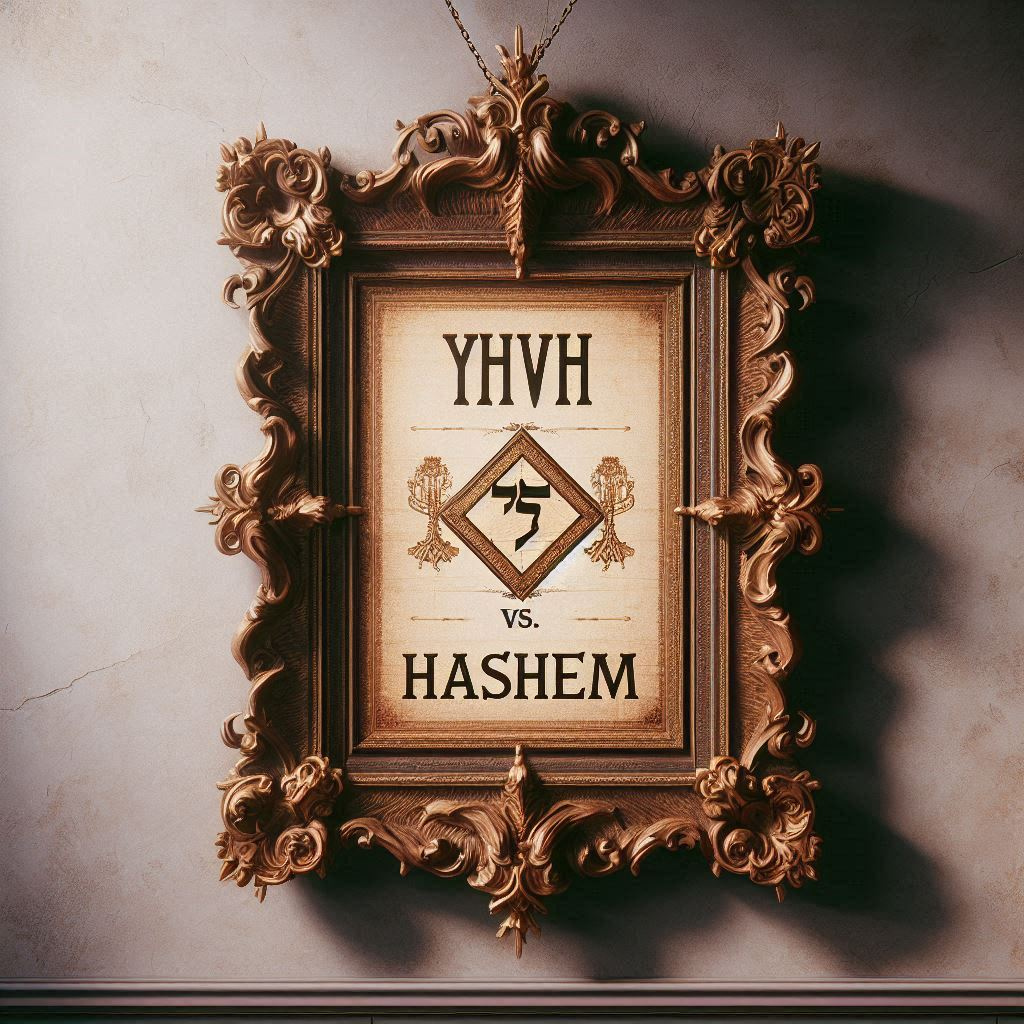The Ineffable Name Controversy: Breaking Traditions and Unveiling Truth
Introduction: In the realm of faith, the Name of Yehovah holds profound significance. However, the tradition of not uttering or writing this sacred name has sparked controversy and debate. This blog post delves into the origins, interpretations, and implications of this practice, shedding light on the true essence of the Ineffable Name.
The Tradition of Writing “G-d”: Many Jewish communities avoid writing the full name of God, opting for “G-d” instead. This practice stems from a passage in Deuteronomy, which commands the Israelites to destroy the names of non-Israelite gods. Rabbinic interpretations extended this to mean that God’s name should not be erased, leading to the tradition of writing “G-d”1.
Rabbinic Interpretations and Misinterpretations: Rabbinic authorities, such as Rashi, interpreted the prohibition against erasing God’s name as a reason to avoid writing it altogether. This led to the practice of storing or burying Jewish literature containing the name “God” once it fell into disrepair2. However, this interpretation has been contested, as the original scriptural intent was to prevent the worship of Yehovah in the manner of pagan gods3.
The True Name of Yehovah: The Father revealed His eternal and holy name to Moses, declaring it to be remembered for all generations (Exodus 3:15). Despite this, Rabbinic authorities replaced the name Yehovah with titles and descriptors like “Adonai” and “Elohim,” effectively nullifying the Torah’s instructions regarding the use of God’s name4.
The Impact of Rabbinic Regulations: By enacting regulations against using God’s name, Rabbinic authorities transgressed Yah’s eternal Torah. This has led to a widespread practice of substituting God’s name with titles, which often have pagan origins5. This practice contradicts the scriptural mandate to declare and magnify Yehovah’s name throughout the earth6.
Conclusion: As Torah-observant disciples, it is our duty to honor and proclaim the true name of Yehovah. By doing so, we fulfill the scriptural command to declare His name to all generations. Let us break free from traditions that obscure the true essence of God’s name and embrace the profound significance of Yehovah.
For those of you who would like to explore this week’s Torah Reading 13, I invite you to read and listen to the discussion entitled “Yehovah: the God Who Sees.” (Yehovah-The God Who Sees-STAR 13)
Marring the Image of the Creator Yehovah Through Rebelliousness-Thoughts and Reflections on Torah Reading 4
Greeting and Introduction Greetings saints of the Most High and welcome back to another installment of the Messianic Torah Observer. I'm Rod Thomas coming to you on a beautiful fall Shabbat in the DFW. Thank you for taking the time out of your busy schedules to...
Was Eve the First Messianic and the Heart of True Worship — Thoughts & Reflections on Torah Reading 3
Greetings Saints of the Most High. I pray that you, your families, and fellowships are well and blessed. It was my intention to do, at the very least, an audio version of this teaching and discussion. However, since our return from our Kenyan missionary...
My Thoughts and Reflections on Whether Messianics/Netsarim Should Take Part in the Upcoming Electoral Process
Greetings Greetings saints of the Most High. I'm Rod Thomas coming to you from the DFW on a rather stormy first day of the week. Thank you for taking the time out of your busy schedules to fellowship with me and as always beloved, it is my hope, trust, and prayer that...
TMTO Update and Thoughts and Reflections on Kenya Missionary-Sukkot Trip
As I am posting these thoughts and reflections, it is the very last Sabbath of the 7th Biblical Month, November 2, 2024. And assuming our contacts in Israel are successful in sighting the renewed moon the evening of this post, we will enter the 8th Month of Yah's...
When Torah Becomes a Witness Against Us — My Thoughts and Reflections on Torah Reading 148
These are my thoughts and reflections on Torah Reading 148. I’ve been led to entitle this discussion: When Torah Becomes a Witness Against Us.” Our reading this week is found in Deuteronomy/Devarim 31.14-30. Key Themes and Concepts Found in our Parashah this...
Be Strong and Courageous — My Thoughts and Reflections on Torah Reading 147
Greetings saints of the Most High. Thank you for taking the time out of your busy schedules to fellowship with me here on this blessed day of rest in Yeshua Messiah. And as always, it is my hope, trust, and prayer that this installment of the Messianic Torah Observer...
Operating in Set-Apart Community Relationships — Torah Reading 142 Thoughts and Reflections
Shalom and Greetings Greetings saints of the Most High. Rod Thomas coming to you on a warm by beautiful Sabbath in the DFW. Thank you for taking the time out of your busy schedules to fellowship with me here on this blessed day of rest in Yeshua Messiah. And as always...
The Realities of the Messianic’s Ongoing War Against this World — Torah Reading 141 Thoughts and Reflections
As I am recording and publishing this installment of TMTO, it is July 20, 2024. It is the 13th Day of the 4th Month of Yah's Calendar Year. So much is going on in the world today. And if you miss a news cycle, you stand a good chance of missing some...
Operating in a Set-Apart-Kingdom Fashion– Thoughts and Reflections on Torah Reading 140
Greetings saints of the Most High. This is Rod Thomas coming to you from the DFW on a rather steamy but blessed Sabbath. I want to thank you for taking the time out of your busy schedules to fellowship with me here on upcoming day of rest in Yeshua Messiah. And as...
John’s Baptism of Repentance–Part 4 of True Biblical Baptism Series
Quick Rehashing of the Previous Parts to this Series This is “John’s Baptism: A Baptism of Repentance.” It is part 4 of our True Biblical Baptism Series. If you’ve not already either read or listened to the previous 3 installments in this series, I humbly...

